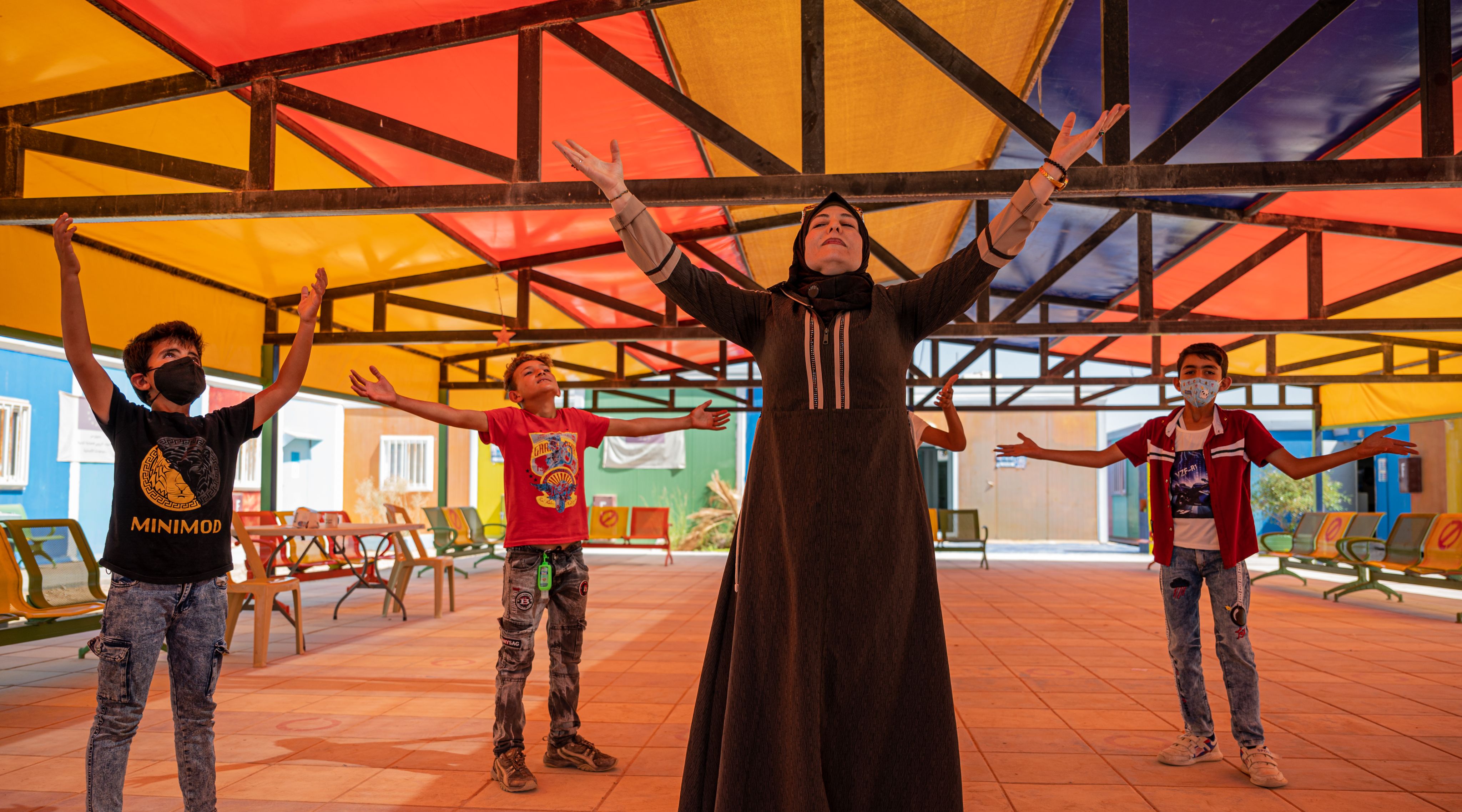A sanctuary from the trauma of war
This World Teachers Day, we celebrate teachers and facilitators like Majd, who work tirelessly to ensure the wellbeing of displaced children.

“Breathe in…and breathe out.” Majd gestures to her fifth-grade class. She’s standing in front of several rows of Syrian refugee children, who have either fled Syria with their families at a very young age or have grown up in Jordan hearing about the atrocities of the war.
“Close your eyes, and think of your safe space,” she says as calming music plays from a small CD player on her desk. “Remember, the key to your safe space is always with you. You can open the door whenever you want.”
Majd facilitates sessions in Azraq Refugee Camp as part of the Better Learning Programme (BLP), NRC’s flagship psychosocial support intervention for children in crisis-affected communities.
“Tell me, where did you go?” she asks, inviting the children to share their safe space with their peers. “Take us there with you.”
“I went to the sea!” says 10-year-old Omar excitedly, jumping up in front of the class.
When crisis hits, children are often among the most affected. Exposure to traumatic events, along with the loss of familiar protective and social systems, burdens them with prolonged emotional and psychological stress.
BLP facilitators are instrumental in helping students work through their fears and anxieties by teaching them a variety of coping techniques, such as visualising a safe space in which they feel relaxed, happy, and safe.
As a Syrian refugee herself, Majd believes that those who have witnessed the trauma of war can more effectively help children who have been affected by crisis.
“If I didn’t believe in how useful the programme is myself, I wouldn’t be able to deliver it to the best of my ability,” she says.
Reaching Jordan
Majd lives with her family only a few minutes’ walk away from NRC’s Education Centre in Azraq, in a snug home furnished with plump purple sofas and cheerful trinkets. She’s been living in the camp for the past five years, ever since her family left Syria.
“I grew up in Syria,” she says. “I never thought I’d leave. It was my whole life.”
When war broke out, the family was determined to stay in Syria, preferring to live a nomadic life rather than leave the country. Their plan soon culminated in disaster, however, when Majd’s eldest son, Laith, was injured by shrapnel.
Fleeing the area, they found themselves stranded in a city that had, unbeknown to them, received evacuation orders.
The family of eight was trapped in a half-metre space, enduring relentless shelling for more than 14 hours, until Majd saw an opportunity for them to leave.
“I grabbed two of my children, asked my husband to grab the others, and we ran,” she says. “Luckily, the barrel of the tank wasn’t aiming at us at the time.”
The family reached the north-eastern city of Al Raqqa and remained there for two months. When the shelling there became unbearable, they fled to the safety of neighbouring Jordan.
Becoming a teacher
“I put my university education on hold when I had children,” says Majd. “I was studying Arabic but my dream was to become a journalist.”
Majd couldn’t cope with life in the camp when she first arrived, and the shock led her to isolate herself and her family from the community. A month later, however, she found herself attending one of NRC’s parental focus groups, and she was selected to become an NRC facilitator for the Better Learning Programme.
“I can’t describe the feeling,” she says, fondly recollecting the moment she was offered the role.
Motivated by the scenes she had witnessed in the war, Majd was determined to help the refugee children work through their trauma. The role gave her purpose and meaning.
“I collapsed when I was asked to draw my safe space,” she says. “The BLP exercises helped me heal my own trauma. Imagine what they can do for the children.”
Every so often, Majd spots a child in her classroom who needs extra support. Some tell-tale signs that a child is experiencing difficulty can include an inability to concentrate, difficulty in retaining new information, self-isolation, and aggression.
Find out more about the psychological impact of conflict and displacement on children
“I wouldn’t be able to focus at home. My mind would be with the child that needs my help,” she says.
One particular case that stands out for Majd is of a child who was unable to draw their safe space. No matter how much they tried, they would end up with an empty canvas. Majd quickly came to understand that the child has never felt safe. Even home was a threatening place.
Majd facilitated one-to-one sessions with the child, and was able to support them through their difficulties. To this very day, the child still visits her to thank her for her support.
What does the future hold?
Her son Laith, now 18, is incredibly proud of his mum and her work at the NRC Education Centre.
“People stop me in the street and ask me to thank my mother,” he says, beaming with pride. “They always say they will never forget her kindness.”
Majd’s husband works in Irbid, part of Jordan’s host community. She was offered the opportunity to leave the camp and join him, but she chose to stay.
“My future is with my [BLP] children,” she says. “If a child is mentally healthy, the future opens to them.”

